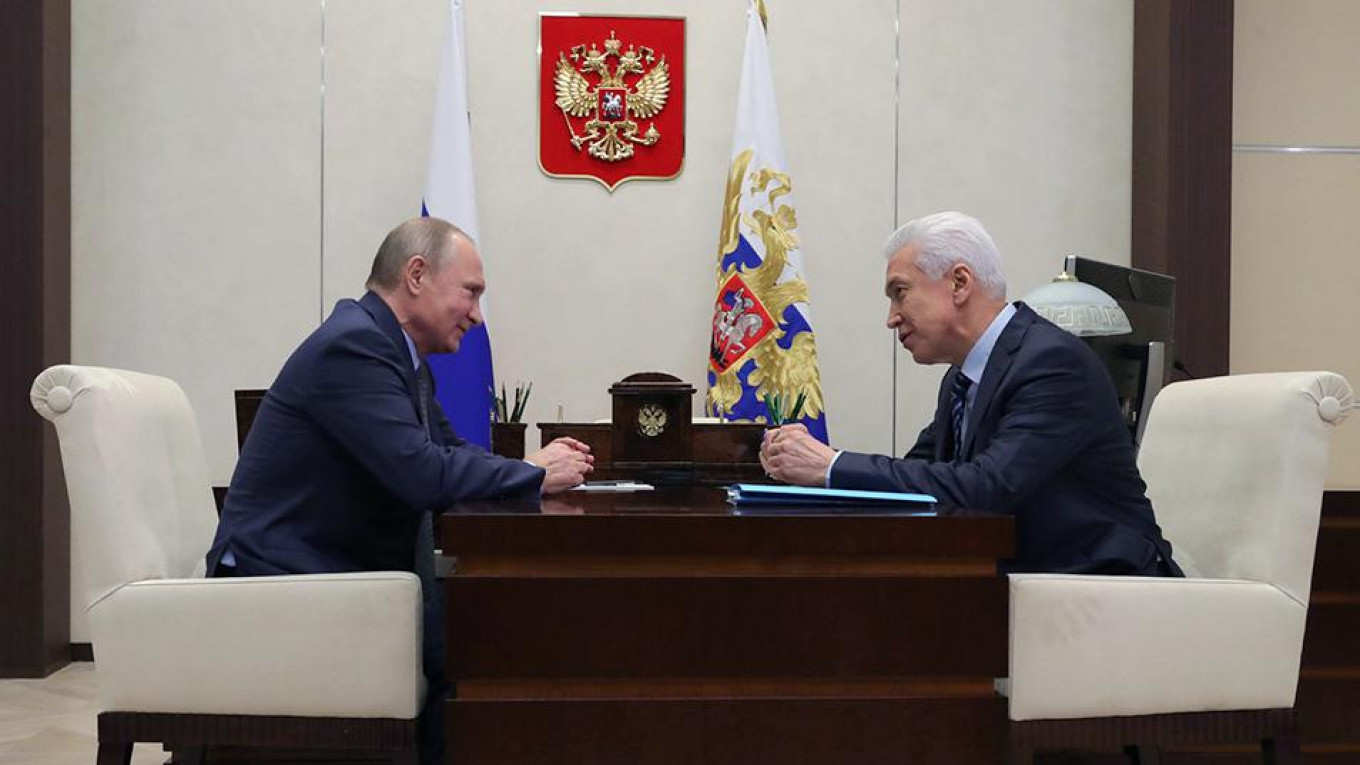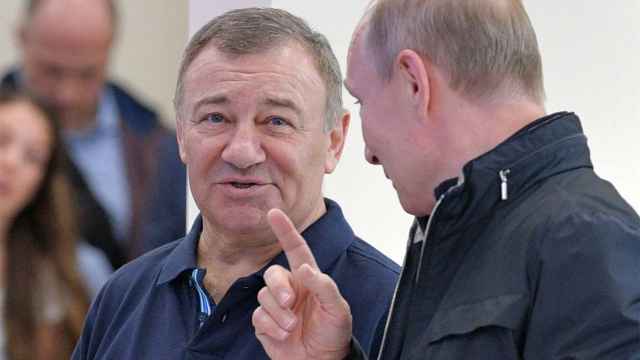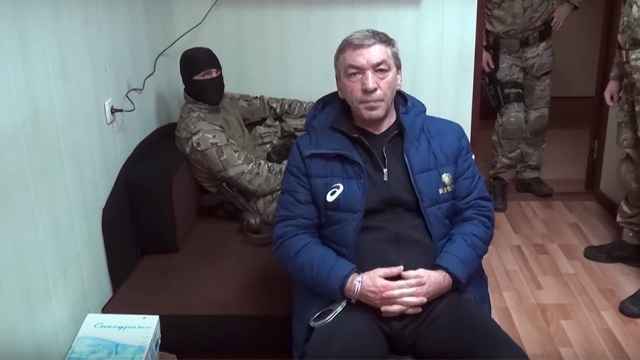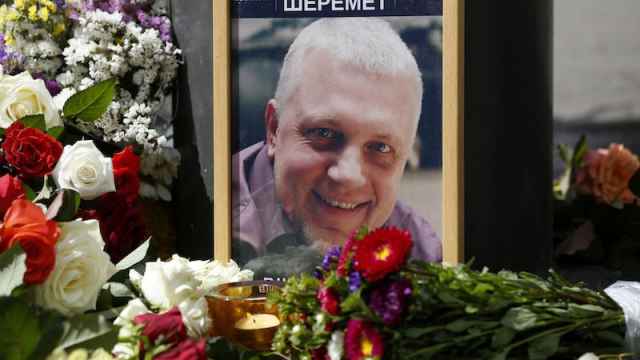The recent arrests of several top officials in the clannish North Caucasus republic of Dagestan have been branded as an anti-corruption campaign by the federal authorities who are leading the crackdown.
And to some extent, it is.
More than that, however, it is about exerting control over Russia’s regions at a time when the Kremlin is struggling under the weight of low oil prices and Western sanctions.
Earlier this year, the Investigative Committee and the Federal Security Service (FSB) arrested Dagestan’s acting prime minister, Abdusamad Gamidov, his two deputies, the republic’s education minister and the mayor of the capital, Makhachkala, on corruption charges.
Scores of investigators from Moscow and other Russian regions were brought to the republic to investigate other senior Dagestani officials.
The arrests followed President Vladimir Putin’s decision last October to replace the head of Dagestan, Ramazan Abdulatipov, with the retired Deputy Interior Minister Vladimir Vasilyev. In doing so, Vasilyev became the first outsider leader of the largest and most populated of the North Caucasus republics in more than six decades.
The predominantly Muslim republic of Dagestan was one of several Russian regions that formally and informally enjoyed preferential treatment after the collapse of the Soviet Union.
In the 1990s, its leadership introduced ethnic quotas for government posts and seats in parliament. The move, they said, would ensure stability in Russia’s most multi-ethnic province.
By holding over Moscow the prospect of ethnic conflict or a separatist insurgency similar to neighboring Chechnya’s, Dagestan’s leadership has milked Moscow for billions of dollars for over a quarter of a century. All the while, they have cemented the clannish structure of the government in which nearly all state functions have been appropriated by just a handful of families.
The federal government has been all but elbowed out of the republic. By way of example, a close ally of Putin, Alexei Kudrin, recently admitted that he was unable to fire a single official in Dagestan when he held the powerful position of finance minister.
Reporting on my native Dagestan for nearly two decades, I remember occasions when senior officials who had been appointed by Moscow were thrown out of their offices and even beaten by local strongmen. The gangs had secured those posts for themselves with the top leadership’s tacit approval.
Corruption ballooned alongside radical Islam as a response to this unfair and violent local government — the system of rule that enjoyed the backing of local law enforcers, clans and the federal security forces, which was tasked with preventing a massive anti-government insurgency.
Dagestan has only managed to avoid a major conflict mainly due to its tradition of grassroots self-governance, which includes Sharia law and local customs that predate Islam.
At the same time, the trickle-down effect from the misappropriation of federal subsidies by officials and clan leaders have kept hundreds of families afloat economically.
For more than two decades, Dagestani leaders have sold the Kremlin this unsteady peace, even though some years have brought with them hundreds of deaths. They have lauded their successes, all the while faithfully delivering above 90 percent of the ballot to Putin and the ruling United Russia party in elections.
In 2013, Putin made Ramazan Abdulatipov the new head of Dagestan. Abdulatipov had left the republic in the 1970s to pursue an academic career. He had then served as a federal lawmaker, minister and even a diplomat after the collapse of the Soviet Union.
The move was an apparent attempt to regain control over a regional government that treated the region as its own fiefdom. But Abdulatipov failed to deliver, quickly installing his relatives into lucrative government posts.
One result of his tenure there, however, was that the federal government no longer feared that an aggressive intervention in Dagestan’s local affairs would result in a massive and violent mutiny.
Shortly after Abdulatipov became the head of the republic, a more powerful and much-feared Dagestani politician, Said Amirov, was arrested in a military operation executed by federal security officers.
Sentenced to life on terrorism charges, Amirov, who was mayor of Makhachkala at the time of his arrest, is widely believed in Dagestan to have been unseated by Abdulatipov who feared a powerful and entrenched competitor. Even though many expected a violent backlash among Amirov’s supporters — he had previously commanded his own army of hundreds of men — nothing happened.
At around that same time, the emergence of Islamic State started to attract violent elements from around the world, including hundreds of battle-hardened Dagestani Islamist radicals who had fought against the security services in the republic. Many of them left Dagestan.
The exodus meant there was a sudden decrease in the threat of an insurgency, which, in turn, would make it more difficult for the regional bosses to sell their role to Moscow. Dagestan’s leadership could no longer pretend they were the ones keeping a lid on the threat of an Islamist insurgency.
At the same time, oil prices in 2014 plummeted and Western sanctions against Russia for its role in Ukraine and alleged U.S. election meddling have taken their toll on the Russian economy.
Now, the Kremlin is looking to cut costs. This includes reeling in economically ineffective regions. At the same time, it wants to strip the regions of their ability to make decisions that pose any threat to federal government policies.
This is why Putin last year launched a broad effort to replace entrenched regional governors who had ties to local elites with younger, largely unknown bureaucrats from other regions.
The series of arrests of governors and other top officials that swept Russia’s regions for the past two years are also part of this effort to regain control.
In the case of Dagestan, the arrested officials belong to key, but different, political groups. The diversity of their backgrounds sends a signal to the regional elite that Moscow will not discriminate between clans. Rather, it shows that Moscow’s aim is to break the existing system and replace it with the so-called power vertical.
The appointment of an outsider, an ethnic Russian and a former economy minister of the Tatarstan republic, Artyom Zdunov, as the acting prime minister of Dagestan earlier in February, underscores this new policy.
It is yet to be seen whether the overhaul in Dagestan results in more effective government or а better business climate. Dismantling the clannish governance system is the right thing to do, but it has to come in tandem with an improved law enforcement and court system that will create opportunities for business and tackle corruption.
None of these institutional steps, however, have been visibly taken in regions other where top officials were replaced months or even years ago.
Nabi Abdullaev is an Associate Director at Control Risks and former editor-in-chief of The Moscow Times. He is a native of Dagestan and has written extensively on the North Caucasus.
The views and opinions expressed in opinion pieces do not necessarily reflect the position of The Moscow Times.
A Message from The Moscow Times:
Dear readers,
We are facing unprecedented challenges. Russia's Prosecutor General's Office has designated The Moscow Times as an "undesirable" organization, criminalizing our work and putting our staff at risk of prosecution. This follows our earlier unjust labeling as a "foreign agent."
These actions are direct attempts to silence independent journalism in Russia. The authorities claim our work "discredits the decisions of the Russian leadership." We see things differently: we strive to provide accurate, unbiased reporting on Russia.
We, the journalists of The Moscow Times, refuse to be silenced. But to continue our work, we need your help.
Your support, no matter how small, makes a world of difference. If you can, please support us monthly starting from just $2. It's quick to set up, and every contribution makes a significant impact.
By supporting The Moscow Times, you're defending open, independent journalism in the face of repression. Thank you for standing with us.
Remind me later.








